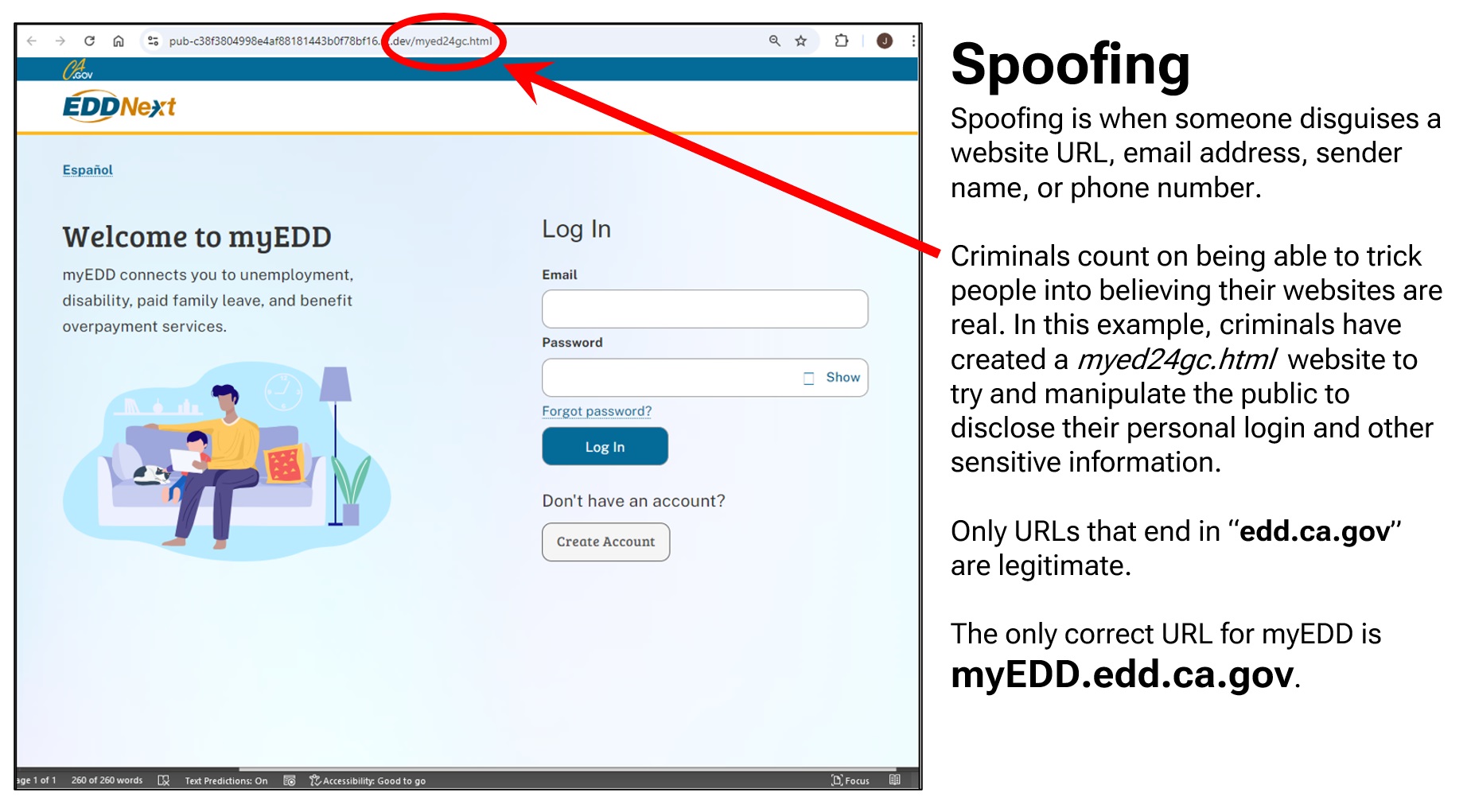NR No. 24-42
Contact: Loree Levy/Greg Lawson
916-654-9029
mediainquiries@edd.ca.gov
What You Need to Know: As the holiday shopping season continues, EDD reminds customers to keep protecting personal and financial information from criminals who use many creative tactics to steal sensitive information—such as phishing, smishing, and even fake websites. EDD also offers tips on how to figure out if something is a scam or trustworthy, and how to distinguish legitimate EDD messages.
SACRAMENTO — As fraudsters continue trying to trick people into disclosing personal information—often by pretending to be a legitimate business or government entity—the Employment Development Department (EDD) reminds Californians to guard against unsolicited requests for personal or financial information.
EDD remains committed to fighting fraud and frustrating criminals who prey on the public. Customers can help by safeguarding personal information and staying informed about common scams that criminals deploy.
EDD never contacts customers to ask for bank or login information. EDD does alert customers by email and SMS text message of changes made in their myEDD online account, including personal or account information and payment method preferences.
Californians should not select links in unsolicited emails or text messages, divulge personal information over the telephone, or visit websites without verifying the website is legitimate.
Real EDD emails end in edd.ca.gov. Real EDD SMS text messages come from 510-74 or 918-06 for unemployment and 35954 or 95937 for disability or Paid Family Leave. EDD’s real website is edd.ca.gov. EDD’s benefit applications are located at: myedd.edd.ca.gov.
Learn About Common Scams
Criminals constantly try to trick people into sharing personal information by text message (smishing), phone call, email (phishing), fake websites, and even search results and online advertising. After fraudsters steal personal information using these tactics the criminals may then make fraudulent purchases or file fraudulent applications for credit or government benefits.
The Federal Bureau of Investigation (FBI) has a useful resource, Common Frauds and Scams, to help people avoid getting tricked by scammers. Common scams criminals use to steal personal information include:
- Tech Support Scams where criminals pose as agents to fix non-existent issues to gain access to your personal information. EDD never contacts customers to ask for bank or login information.
- Holiday Scams where criminals offer deals that are too good to be true and then never deliver the product or service.
- Charity fraud where criminals seek donations for organizations that do little or any charitable work.
- Spoofing and Phishing Schemes in which criminals disguise an email address, sender name, phone number, or website address—often by just changing one letter, symbol, or number—to trick victims into interacting and disclosing personal information. Always confirm your EDD activity is on the official EDD website, edd.ca.gov.

Protect Your Personal Information
If someone calls or texts asking for claim or bank account information over the phone, by email, or by text message—don’t share it! Never give unknown requestors sensitive information such as:
- Name and date of birth
- Social Security number
- Bank account information
- EDD Customer Account Numbers
- EDD benefit payment information
- Credit card number, expiration date, or CVV
- Photos of government documents
- Phone type
- Mobile carrier
- Credit score
Californians are encouraged to remain vigilant and safeguard information to help prevent fraud. To learn more or report fraud, visit Help Fight Fraud.
Report Fraud
If you believe you’ve become the victim of a scam or fraud, report the crime to law enforcement and take steps to protect your personal information and accounts. If you receive documents from the EDD but did not file a claim for benefits, someone may have filed a claim under your name, address, or Social Security number. To report benefits fraud, visit Report Fraud in Ask EDD. You can also call the EDD Fraud Hotline at 1-800-229-6297.
